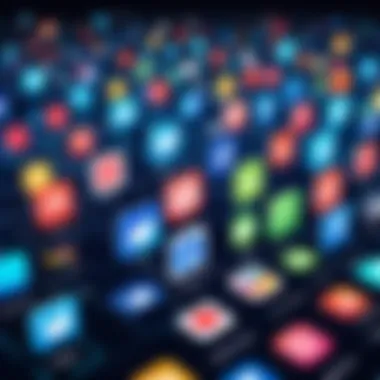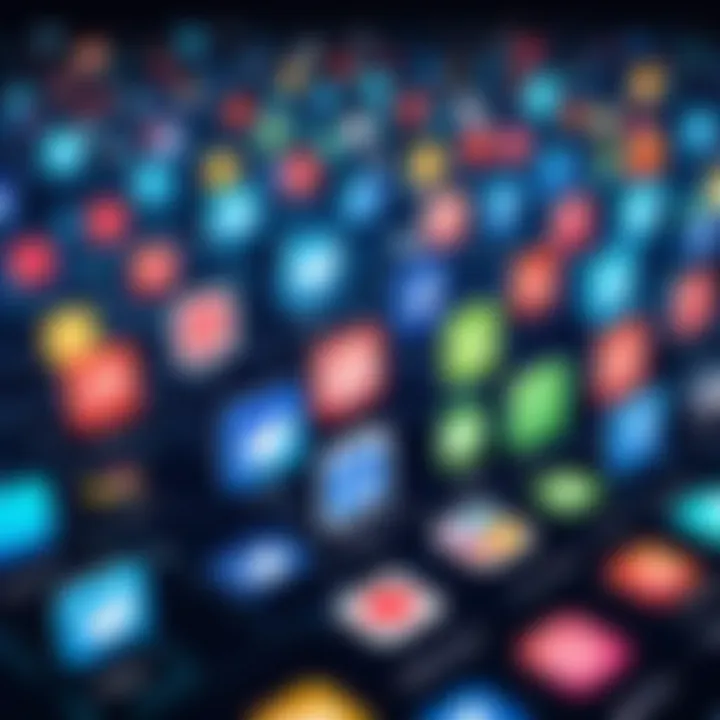Exploring Social Media's Influence on Relationships


Intro
Social media has infiltrated nearly every aspect of our lives. It's hard to imagine a day without scrolling through feeds or checking notifications. This constant connectivity brings with it a blend of blessings and curses, especially when it comes to our personal relationships. From strengthening connections with long-lost friends to creating new insecurities through curated online personas, social media shapes interaction in unexpected ways.
In this exploration, we’ll dive into how these platforms redefine communication styles and emotional bonds, while also exposing the potential pitfalls lurking behind the screens. Buckle up as we navigate through the intertwined realms of likes, shares, and, perhaps most importantly, the impact on real-world connections.
Technology Insights
As we venture further into the subject, let’s take a closer look at the technological landscape that supports this social connectivity. The tools we use to engage with each other harbor complex dynamics that influence our relationship patterns.
Latest Tech Trends
It’s no secret that new features and platforms emerge at the speed of light. For instance, the rise of ephemeral messaging apps such as Snapchat has changed the way we communicate. People are now more inclined to share candid moments, altering the expectations of honesty and authenticity in relationships.
- Ephemeral Content: The temporary nature of these messages encourages spontaneity but can also lead to misunderstandings if one party perceives these chats as less serious.
- Algorithm-Driven Feeds: Algorithms curate what we see, often leading to envy when friends seem to be living their best lives. This affects emotional well-being and relational dynamics.
Innovation in Tech
With the ongoing advancements in technology, it’s crucial to discuss the innovations that forge relationships in modern contexts. Apps are becoming increasingly sophisticated in enabling connections.
- Augmented Reality Experiences: Where once we were limited to static images and text, platforms now offer immersive experiences that enable virtual gatherings. This could either foster a sense of presence or create a substitute for face-to-face interaction.
- AI-Driven Matchmaking: Dating apps like Tinder and Bumble have evolved into powerful tools that shape romantic relationships, allowing users to connect with others who share similar interests. However, this raises questions about misleading representations and superficiality in dating.
"Tech brings us together but can also deepen the divides, creating a paradox in how we engage."
Emotional Connectivity
Social media's influence also stretches far beyond just how we communicate. Emotionally, it taps into our vulnerabilities and enhances our capacity to connect or, conversely, to drift apart.
Impact on Communication Patterns
Communication dynamics have shifted dramatically. Texting has replaced much of our vocal exchanges. Here’s how:
- Availability: The expectation for instant communication can be a double-edged sword. People might feel pressured to respond immediately, leading to miscommunication.
- Tone Misinterpretation: Without vocal cues, sarcasm and humor can often be misread, leading to conflicts that wouldn't have occurred in face-to-face conversations.
Influence of Online Personas
Each individual curates their online presence, showcasing life highlights that may not reflect reality. This facade can create an illusion that influences relationships:
- Jealousy and Comparison: Constant exposure to the highlight reels of others can spark feelings of inadequacy among friends and partners.
- Dopamine Hits from Likes: The addiction to affirmation through likes can lead individuals to prioritize online validation over genuine relationships, sometimes skewing their self-perception.
Synthesis and Reflection
As we peel back the layers of social media’s influence on relationships, we find a tapestry woven with both vibrant and darker threads. The innovation behind communicative technology underscores an underlying need for connection. Yet, the emotional landscapes they create must be navigated with caution.
Moving forward, understanding the nuances of digital interactions is essential. In a world where a simple chat can spiral into misunderstandings, the importance of nurturing face-to-face interactions remains paramount. After all, while social media expands our network, authentic relationships thrive in genuine connections.
Prelims to Social Media and Relationships
In today’s world, social media has woven itself into the very fabric of our daily interactions and relationships. Understanding how it influences personal connections is not just an interesting pursuit, but an essential one in navigating modern life. This exploration considers the balance of benefits and drawbacks that come with social media use, emphasizing the complexity of its impact on relationships.
The importance of examining social media's role lies in its profound reach. Relationships—whether romantic, platonic, or familial—now often span digital spaces. Social media platforms like Facebook, Twitter, and Instagram allow individuals to maintain ties that might otherwise falter due to distance or busy schedules. However, this connectivity can come at a price; it challenges traditional norms of communication and can lead to misunderstandings or conflicts.
Defining Social Media in the Modern Context
Social media is a term that encompasses a vast expanse of digital networks and platforms designed for interaction, sharing, and engagement. At its core, social media allows users to generate content, share ideas, and connect with others in real-time. Yet, what precisely constitutes social media today?
Common examples include:
- Facebook: A platform for sharing personal updates, photos, and videos.
- Instagram: More focused on visual content, it combines storytelling with imagery.
- Twitter: Known for its brevity, this platform encourages quick exchanges and trends.
- Reddit: A diverse amalgamation of communities where topics range from opinions to niche interests.
In a nutshell, it's not just about sharing content anymore; it's about building communities, influencing others, and forming relationships that can exist only in digital formats.
Historical Overview of Social Media's Evolution
The evolution of social media can be traced back to the late 1990s and early 2000s, a time when the Internet began to burgeon in public usage. Early platforms like Six Degrees, launched in 1997, allowed users to create profiles and list friends. A few years later, Friendster emerged, gaining popularity for its user-friendly interface and social networking capabilities. These paved the way for giants like MySpace, which became a trendsetter in personal expression and networking.
The watershed moment arrived with Facebook's launch in 2004. It unified various features from previous sites, like profile customization and the ability to share updates with friends. Facebook’s climb to dominance fundamentally altered how individuals maintain their personal networks.
Fast forward to today, and we see diverse platforms catering to unique audiences and interests. The rise of mobile technology has further advanced the accessibility and immediacy of social media, leading to a much more connected world. Yet, each stage of this evolution has brought its own set of challenges and opportunities for how we communicate, connect, and sometimes conflict with one another.
"The rapid evolution of social media continues to shape the landscapes of relationships, often in ways we don’t fully grasp yet."
Understanding these foundational elements of social media provides necessary context for delving deeper into its implications for relationships in this article.


The Role of Social Media in Communication
Social media is reshaping the way we communicate, blurring the lines between personal and public interactions. We no longer rely solely on face-to-face conversations or phone calls. Instead, a multitude of platforms now serve as our primary means of connection. This shift is pivotal; it not only affects how we foster our relationships but also reshapes the landscape of our social dynamics. Platforms like Facebook, Twitter, and Instagram have revolutionized the way we share experiences and convey emotions. The importance of this transformation cannot be overstated, as it ushers in both advantages and challenges.
Shifts in Communication Strategies
With the dawn of social media, traditional communication strategies have undergone a seismic shift. The immediacy of messaging apps enables quick exchanges, where responses are often expected within seconds. This has molded a culture where brevity reigns. For instance, the use of memes or GIFs has taken precedence over lengthy explanations or detailed narratives, allowing for a form of expression that is both visual and fleeting. People are embracing short, impactful messages which can often lack nuance.
Moreover, the asynchronous nature of communication on platforms like WhatsApp or Snapchat leads to varied interpretations. One might read a text message and misinterpret the emotions behind it. Often, we find ourselves typing messages with a specific tone, but as they travel through a screen, they can lose their original intent, causing unnecessary friction in relationships. This necessitates a more conscious effort to clarify one's feelings, especially when those feelings are as complex as jealousy or worry.
Impact on Verbal and Non-Verbal Cues
Social media impacts not just what we say but how we express ourselves. The absence of body language and facial expressions in text-based communication dramatically changes the game. While emojis have burst onto the scene, adding a layer of emotional context, they are still a poor substitute for real human interaction. What happens when a smiley face doesn't quite cut it? Misunderstandings become part of our digital lexicon.
Interactions that happen in person offer a rich tapestry of non-verbal cues. Eye contact, gestures, and tone of voice enrich the dialogue in ways that simple text cannot capture. A joke may land well in person, yet through a text message, it may fall flat or be taken the wrong way. Additionally, the art of conversation has shifted greatly; we may find ourselves crafting responses rather than engaging in a natural back-and-forth exchange.
"Communication is not just about words, but how we connect beyond them."
Understanding this complex interplay of verbal and non-verbal cues amidst the digital rush leads to more mindful relationships—a critical endeavor in this modern age.
Benefits of Social Media on Relationships
In our digital age, the landscape of personal connections has been profoundly altered by the rise of social media. This section unpacks the myriad benefits social media brings to relationships, encapsulating how it affects communication styles, emotional bonds, and even the formation of new connections. These platforms not only enable conversations to flow seamlessly across distances but also enrich our relational experiences in unexpected ways.
Strengthening Connections Across Distances
Social media plays an indispensable role in bridging geographical gaps. Consider a scenario where a university friend relocates to another country. Without platforms like Facebook, Instagram, or WhatsApp, maintaining that friendship could swiftly become a daunting task. Yet, through a simple comment or a shared photo, the essence of that relationship can endure the test of time and space.
Moreover, think about long-distance families. With tools that facilitate video calls or group chats, family members can witness milestones—be it a child’s first step or a graduation ceremony—almost in real-time. This sense of participation nurtures emotional ties, vastly improving relational satisfaction despite the miles in between.
"Social media offers a lifeline to relationships, making distance feel less daunting and connection more accessible."
Facilitating New Relationships
Another significant boon of social media is its capacity to foster new relationships. The once solitary endeavor of meeting people is now transformed. Platforms like Reddit or even niche Facebook groups allow individuals with similar interests to connect. Whether it’s through a shared hobby, professional ambition, or even a passion for a specific show, strangers can become friends with a simple click.
This is especially vital in an era where traditional social hubs may be dwindling. If one might feel lost in a new city, apps like Meetup or specialized communities offer avenues to meet like-minded individuals who share common interests. As people engage in discussions, swap stories, or rally behind a mutual cause, the potential for genuine friendships—including, at times, romantic connections—skyrockets.
In summary, social media acts as a facilitator of connection, both familial and friendly. While it can’t replicate the depth of face-to-face interactions, it sure does close the gap. Through understanding these benefits, it becomes clearer why social media remains an integral part of our modern relationships.
Negative Impacts of Social Media on Relationships
Social media can be a double-edged sword when it comes to personal relationships. While many benefits arise from its use, the darker side often doesn’t get as much air time. It's important to shed light on how social media can breed complexities that lead to erosion of trust, increase feelings of inadequacy, and create misunderstandings. This section delves into two crucial elements: jealousy and insecurity, and the risk of miscommunication, both of which can cast long shadows over relationships.
Jealousy and Insecurity
Jealousy has a way of creeping into relationships, and social media can act as a fuel to this fire. It’s not unusual to see partners scrolling through their feeds, encountering posts that spark envy. For instance, someone might come across suggestive photographs of an ex or see their current partner engaging with old flames. This can easily trigger feelings of inadequacy. "Why don’t I look like that?" or "What do they have that I don’t?"—these thoughts can bubble up and create a wedge.
The visual nature of platforms like Instagram or Facebook means that every post tells a story. However, these stories are often highly curated, showcasing the best moments while glossing over the mundane or tough parts of life. As a result, individuals may become fixated on an idealized version of reality, leading them to question their self-worth. Such insecurities can poison the trust within a relationship, as partners may start doubting each other’s intentions.
The Risk of Miscommunication
The way we communicate has undoubtedly changed with the rise of social media, but this change isn’t without its risks. Tone, context, and non-verbal cues carry a weight that often gets lost in the digital shuffle. For example, a simple text message can be read in multiple ways. A phrase that sounds harmless to one person may come across as curt or dismissive to another, leading to unnecessary tension.
This miscommunication can escalate quickly. One partner sees a direct message from someone else and misinterprets the interaction, possibly assuming infidelity or a flirty intent that wasn't there in the first place. As issues combine—like the emotional fallout of jealousy with the potential misunderstandings born from text messages—it’s no surprise that many relationships suffer.
- "Words can be weapons, and in the digital age, they can wound in an instant without context."
In summary, while social media fosters connection, its potential to cultivate jealousy and spawn misunderstandings cannot be overlooked. It calls for a conscious effort to navigate the complexities of modern communications. Recognizing these negative impacts is the first step toward maintaining healthy relationships in a constantly connected world.
Changing Perceptions of Privacy
The idea of privacy has morphed dramatically with the advent of social media and its pervasive role in our daily interactions. One pivotal aspect to consider is how platforms like Facebook, Twitter, and Instagram have reshaped our perception of what it means to keep private matters, well private. In the past, the boundaries between public and private life were clearer. Now, they blur like ink on a wet page.
Influential figures and their meticulously crafted online personas often become the yardstick by which we measure our own visibility. With every post, tweet, or story, we put bits of our private lives on display for the world to see. This reach can be double-edged. On one side, sharing personal experiences can foster connection and empathy. On the flip side, it raises questions about what should remain under wraps.
The Public Nature of Private Relationships
In this era of oversharing, plush relationships that were once private often make their way into the public domain. It’s like attending a cookout and unknowingly spilling family secrets for all to hear. A few taps on a smartphone screen can reveal everything from a casual outing to intimate moments, compelling partners to weigh the consequences of their shared narratives. In a world where your relationship is just a post away from becoming gossip fodder, the stakes are elevated.
- Social Media Sharing: People might share vacation pictures while bickering over what to post can provoke tensions.
- Feedback Loop: Likes and comments can become a measure of relationship worth, generating anxiety over public perception.
The risk is palpable. Incidents of relationship struggles or break-ups being aired online can lead to unwanted attention and unsolicited advice that complicates an already sensitive situation. Just ask any couple who went through a breakup while the world watched. It can feel like a circus, with spectators analyzing every interaction.


"In relationships, it's no longer just about 'you' and 'me;' it's about 'us' in front of an audience."
Navigating Boundaries
Setting boundaries in the social media landscape is crucial yet challenging. It’s akin to trying to build a fence on shifting sands — every gust of wind shifts the ground beneath our feet. Couples often grapple with how much to share, when to share, and with whom to share. The conversation about boundaries might begin as a whisper but can quickly escalate into a shouting match, especially when expectations aren’t aligned.
Here are some strategies for maintaining healthy boundaries:
- Discuss Comfort Levels: Partners should openly discuss what’s comfortable. What might seem innocuous to one can feel like an invasion of privacy to another.
- Establish Shared Policies: Agree on what to share about your lives and your relationship, creating a mutual understanding. It’s not about restricting freedom but more about protecting your relationship.
- Keep Certain Moments Sacred: Recognize the value of private moments, and sometimes keep that shared joy or sorrow just between the two of you.
As social media continues to evolve, so too must our conversations around privacy in relationships. It’s essential to navigate these waters thoughtfully, lest we find ourselves adrift in a sea of oversharing without a life raft.
The Influence of Online Personas
In the age of social media, individuals curate digital versions of themselves, crafting online personas that may or may not align with their true selves. This phenomenon plays a crucial role in shaping personal relationships. The authenticity—or lack thereof—of these personas can significantly influence interactions and perceptions in both positive and negative ways. Understanding these dynamics is essential for navigating the complex landscape of relationships in today's digital world.
Curated Realities and Authenticity
Social media platforms provide users with tools to shape their narrative. Many individuals post pictures, statuses, and bios that highlight the best aspects of their life, creating a kind of highlight reel. This curated reality can foster feelings of admiration but also lead to comparisons that might not reflect the whole truth.
For instance, consider two friends, Emily and Sarah. Emily posts idealized photos of vacations, delicious meals, and heartfelt moments. On the surface, everything looks perfect. However, behind closed doors, she struggles with anxiety and loneliness. Sarah, seeing only the curated version of Emily’s life, may feel inadequate or envious, leading to misunderstandings between them.
This idea of curated realities raises questions about authenticity. When individuals present their lives through a filter, it can blur the lines between reality and fiction. As such, the authenticity of relationships can be called into question. Are the connections genuine, or are they merely reflections of carefully crafted images? For a relationship to thrive, authentic interactions are imperative. It’s vital for individuals to recognize and navigate these curated realities thoughtfully.
Impact on Self-Image and Relationship Dynamics
The influence of online personas doesn’t stop at mere presentation; it seeps into an individual’s self-image. Social media can affect how people perceive themselves, both positively and negatively. Users often seek validation through likes and comments, which can create a feedback loop that either bolsters or undermines self-esteem. The digital applause for seemingly flawless posts can erroneously reaffirm a sense of worth based upon superficial metrics. Conversely, a lack of engagement may evoke feelings of inadequacy and doubt.
As relationships intertwine with self-image issues, the dynamics shift. For example, one partner might embrace a charismatic online persona, believing it is an extension of their real self. However, if their partner begins to compare themselves unfavorably to this curated image, it can lead to friction. Potential arguments about perceived authenticity or feelings of not measuring up could arise—these discussions are all too common among couples trying to navigate the blurred lines between online and offline identities.
From this perspective, understanding the implications of online personas becomes essential. Navigating the complexities of self-image in the digital sphere is not easy, but awareness is the first step toward fostering healthy relationships.
"In a world where comparisons are just a click away, maintaining an authentic self becomes not just a personal journey but a relational necessity."
In summary, online personas have an unmistakable impact on how individuals interact and perceive themselves. Recognizing the nuances between curated realities and authentic connections can assist in building healthier relationships in this social media landscape. This understanding is vital for anyone seeking to maintain depth in their interpersonal connections amid a climate often dominated by appearances.
Social Media and Mental Health
Social media has woven itself into the very fabric of our everyday lives. Whether we’re scrolling through Instagram, engaging with friends on Facebook, or tweeting our thoughts, the way we connect online can vastly influence our mental health. Understanding this connection is crucial as it helps elucidate the depths of emotional well-being in this digital age.
Direct Effects on Emotional Well-Being
It’s becoming increasingly clear that social media can have a profound impact on our emotional health. For some, these platforms offer a sense of belonging. They provide a space where individuals can share their victories and woes alike. This interconnectivity can foster support networks, allowing people to lean on one another during tough times. For instance, a singular post about a life challenge can generate a wave of supportive comments, lifting spirits during moments of self-doubt.
Yet, this connection comes with its share of caveats. Constant exposure to curated lives can lead to feelings of inadequacy. People often compare themselves to the highlight reels of others, which can be detrimental to self-esteem. For example, seeing friends enjoy spectacular vacations might prompt feelings of jealousy and longing. This aspect of social media reminds us of the grass always seeming greener on the other side, encouraging unhealthy comparisons rather than fostering genuine happiness.
Moreover, social media can trigger anxiety. The need to maintain a certain online image may cause individuals to overthink their interactions or strive for unattainable perfection. It’s a setup for emotional turmoil; one might find themselves spiraling after receiving minimal likes on a post or scrolling through negative comments. Such instances can disrupt peace of mind, impacting broader aspects of daily life.
Indirect Effects Through Relationship Quality
An often-overlooked avenue through which social media impacts mental health is its effect on relationship quality. Relationships are the cornerstone of emotional well-being. Healthy connections can buffer stress and enrich our lives, yet the quality of these interactions can be significantly altered by social media use.
In a world where relationships extend beyond the physical realm, social media can both strengthen and weaken bonds. For example, friends might stay connected across great distances, sharing milestones and emotions, enhancing intimacy. But at the same time, over-reliance on digital communication might lead to surface-level interactions rather than meaningful connections.
Additionally, the presence of social media can create misunderstandings. Miscommunication thrives in a limited text format, where tone and expression can be easily misconstrued. This may lead to unnecessary conflicts and tension in relationships, as differing interpretations of messages spark disagreements. A simple “K” can morph from an acknowledgment to a perceived disinterest, exacerbating emotional rifts.
Understanding the Balance
Navigating social media’s complexities is essential, as the interplay between online and offline relationships profoundly influences mental health. Balancing real-life connections with online interactions is key to maintaining emotional well-being. Being mindful of social media consumption can also help individuals protect their mental state.
It’s important to remember that social media is a tool. It can enhance or detract from mental health, depending on how we use it. Assessing our online habits is essential for nurturing emotional well-being in a connected world.
Generational Differences in Social Media Usage
The influence that social media exerts on personal relationships can vary significantly across different generations. As technology continually updates, so do the habits and expectations of users. Understanding these generational differences in social media usage is crucial. When we recognize how various age groups interact with these platforms, we can better address their unique relationship dynamics. Moreover, it illuminates the significant contrasts between youthful exuberance and more mature perspectives.
Distinct Patterns Among Age Groups
Age plays a crucial role in determining how individuals engage with social media. Younger generations, particularly Gen Z and millennials, are typically more inclined to embrace social media as a primary avenue for communication. They utilize platforms like Instagram, TikTok, and Snapchat to express themselves, connect with peers, and even find romantic partners.
Older generations, such as Gen X and baby boomers, have a different take. Their engagement tends to revolve around platforms like Facebook, where they may focus more on keeping in touch with family or connecting with past acquaintances. It is fascinating to observe how much social media shapes communication preferences across these age groups.
Even within each generation, the patterns can differ widely. Young users often see social media as a means of entertainment and self-expression, while older users may prioritize practical uses, like staying updated on news or communicating with loved ones. This could lead to some friction; misunderstandings might arise when older individuals misinterpret the light-hearted banter or casual tone that younger users adopt in their online exchanges.
- Gen Z is generally characterized by quick exchanges, memes, and trends.
- Millennials often blend personal branding with social interaction, curating their images meticulously.
- Gen X users may appreciate straightforward communication, often seeking deeper connections rather than likes or shares.
- Baby boomers tend to use social media for familial ties and nostalgia, sharing memories rather than transient trends.
Each of these distinctions highlights that age influences expectations around social media use, shaping the way these generational groups approach their relationships.


Impact on Relationship Expectations
Generational attitudes towards relationships have evolved alongside social media. For younger users, online interactions can often be seen as a precursor to real-life connections. They might rely heavily on direct messaging and commenting, fostering relationships that often begin in the digital realm before transitioning to face-to-face meetings. Conversely, older generations may hold a different viewpoint, typically valuing in-person interactions much more. They might be reticent to form connections online, preferring to build bonds through shared experiences.
These differences can lead to varied expectations when it comes to romantic relationships. For instance, younger individuals may expect a quicker, more fluid development in their connections facilitated by social media, signaling interest through likes and comments instead of more traditional interactions like calling. Meanwhile, older generations may find this approach lackluster or even insincere, valuing meaningful conversations over mere digital exchanges.
Here are some key points to ponder:
- Trust and Intimacy: Younger generations may form bonds quickly, but older individuals might emphasize longer-lasting connections built on trust.
- Communication Styles: The use of emojis, memes, or GIFs can convey feelings that traditional conversations would express differently, leading to misunderstandings across age groups.
- Conflict Resolution: Older users may prefer face-to-face discussions when conflicts arise, while younger users might opt for texting or social media channels instead.
"In an age where a relationship can be measured in likes, followers, and shares, the foundation of genuine connection can sometimes feel elusive."
As we navigate these differences, it's pivotal to adapt our communication approaches and expectations depending on our generational context. Embracing these distinctions can help bridge the gap and foster healthier, more understanding relationships across the different stages of life.
Social Media's Role in Conflict Resolution
In today's landscape, social media isn’t just a conduit for sharing memes or holiday snaps; it's also a tool influencing how conflicts are engaged and resolved. With platforms like Facebook and Twitter serving as battlegrounds for opinions and expressions, they create a unique environment where relationships are tested and, at times, fortified. This section delves into how social media can facilitate discussions and inadvertently escalate conflicts among individuals, greatly affecting personal relationships.
Facilitating Discussions
Social media has emerged as a platform for dialogue, offering a space where individuals can voice their thoughts, share experiences, and engage in conversations about sensitive topics. It's the new town square, where you can find discussions on everything from politics to personal grievances.
- Open Channels: The immediacy of social media allows for rapid communication. Take, for example, a couple hashing out a disagreement. Instead of waiting to talk face to face, they can express their feelings through direct messages or posts. This can lead to resolution on the spot or a deeper understanding of each other’s perspectives.
- Diverse Input: Engaging with online communities can provide access to broader viewpoints. When a person shares their conflicts on platforms like Reddit, they may receive advice from people who have walked a similar path. This input can help individuals see their issues in a new light, fostering empathy and an informed base for discussions.
- Support Systems: Social media provides an avenue for emotional support. Friends and family can weigh in on conflicts as they unfold, offering a sense of solidarity that can help those involved to navigate turbulent waters more smoothly.
However, there are strings attached. While these benefits are prevalent, it is vital to remember that the very nature of online dialogue can lack the nuances of face-to-face exchanges, which sometimes complicates the issue further.
Escalating Conflicts
Conversely, while social media can offer a way to resolve issues, it also has a knack for turning small disagreements into all-out wars. Misunderstandings can snowball quickly due to the absence of non-verbal cues and context, which play a huge part in communication.
- Misreading Intent: What may seem like a harmless comment can be interpreted as a personal attack. For instance, a joking post might be taken seriously and create unnecessary tension. When people can type words without seeing the other person’s reaction, the danger of miscommunication looms large.
- Public Spectacle: Conflicts that explode into public view can become messy fast. Imagine a couple airing their grievances publicly on platforms like Facebook. Comments from friends can turn private disputes into public drama, leading to further escalation. Suddenly, it’s not just about the two people involved—everyone has a stake, adding layers of complexity to an already fraught situation.
"Social media can act like gasoline on a fire; it can flare up emotions faster than you can blink and create a situation that is hard to put out."
- Echo Chambers: Engaging with people who share similar views can sometimes amplify conflicts. If one individual expresses discontent and their followers support their viewpoint without balancing it with the contrary perspective, it can create a coalition against the other party, complicating reconciliation efforts.
In summary, social media sits at a crossroads in relationships. It offers tools for enhancing dialogue and connection but carries the potential to elevate disagreements to unsettling heights. Those navigating this digital terrain must tread carefully, weighing the benefits against the pitfalls of online interactions.
The Future of Relationships in a Social Media Landscape
As we stand on the cusp of a rapidly changing technological era, the implications of social media for personal relationships emerge as a topic of great significance. Not only are we witnessing the evolution of how individuals communicate, but we're also grappling with shifting paradigms that touch upon emotional resonance and real-life interactions. The future of relationships in this digital landscape encompasses not just the nuts and bolts of connectivity but delves deep into the essence of what it means to maintain human connection in a world that increasingly intertwines our online and offline personas.
Evolving Communication Trends
One noteworthy trend in the realm of communication is the increasing reliance on visuals over text. Platforms such as Instagram and TikTok have pried traditional dialogues apart, replacing them with snippets filled with images, memes, and videos. This shift not only influences how we express sentiments but also how we interpret them. For example, consider the way a simple emoji can encapsulate an entire range of emotions— from joy to sarcasm.
Furthermore, voice notes and video calls are becoming staples in everyday conversations. They add an intimate layer that mere written words often fail to convey. The blend of real-time emotions with digital efficiency creates a dynamic environment where relationships can blossom or falter, depending on how adept individuals are in navigating these modern communication avenues.
"Communication is the lifeblood of relationships, but the medium can often alter its pulse."
This alteration brings about unique challenges. For instance, the nuances of tone and inflection can get lost in translation, leading to misunderstandings. Friends might misinterpret banter as hostility, or partners might question the intent behind a quick message sent at an unusual hour. Hence, the merging of different communication forms generates both opportunities for deeper connection and potential pitfalls that require attention.
Potential Changes in Relationship Dynamics
The intertwining of social media into personal relationships paves the way for notable changes in relational dynamics. These shifts can shape expectations and interactions within relationships in numerous ways. For starters, the expectation for immediate responsiveness can place enormous pressure on individuals. The notion that one must be perpetually available creates an atmosphere where anxiety can fester.
One substantial consideration is the concept of online presence and its impact on intimacy. The act of sharing one’s life publicly— from vacation photos to baby milestones— can create a sense of community. However, it can also lead to jealousy or competition among peers. Comparisons are rife, whether stemming from curated lifestyles on Facebook or filtered experiences on Instagram. As a result, individuals may start prioritizing their online selves, potentially leading to a disconnect with their actual relationships.
Moreover, the digital realm is fostering a rise in ghosting and breadcrumbing— phenomena that were less prevalent in previous generations. The ability to navigate relationships through social media can sometimes lead to a lack of accountability and closure, leaving affected parties in emotional limbo. Understanding that these dynamics are not just fleeting trends but rather a reflection of evolving societal norms is crucial.
In essence, while social media carries the promise of enhancing connections, it equally poses challenges that deserve scrutiny. How relationships adapt to these changes will define the future landscape of human interaction, beckoning a deeper reflection on our shared experience in this complex digital age.
Epilogue: Navigating the Complex Terrain of Social Media and Relationships
The rise of social media has fundamentally transformed how we connect with one another. It has introduced a multitude of platforms, allowing us to maintain long-distance friendships and foster connections that might have otherwise previously been impossible. However, this connectivity doesn't come without its complications. Relationships, once navigated through face-to-face conversations and body language, now often occur through a screen, leading to both rich communications and considerable misunderstandings.
Understanding this dynamic is critical. One must keep in mind how a like, a share, or even a seemingly benign emoji can alter the expectations and behaviors of individuals within a relationship. The implications can range from enhanced emotional closeness to damaging misunderstandings that fuel jealousy or insecurity.
Furthermore, the implications of these interactions extend beyond individual relationships into broader societal norms around communication and connection. As social media becomes a more permanent fixture in our lives, acknowledging its impact on personal interactions, emotional health, and relational expectations is imperative.
Thus, navigating this terrain requires careful consideration. Adopting a mindful approach to how we utilize social media in relation to our bonds with others, while also understanding the layers of complexity at play, can ultimately lead to healthier relationships.
Key Takeaways
- Dual Nature of Social Media: Social media serves as both a bridge and a barrier in relationships. It can deepen connections but also introduce issues of miscommunication and jealousy.
- Impact on Communication: Changes in how we express feelings through digital mediums can obscure intentions, necessitating greater understanding and clarity.
- Evolving Boundaries: The line between public and private lives has blurred. Understanding this shift is crucial for relationship maintenance.
- Societal Shifts: As social expectations change, so do the dynamics of social interactions, influencing everything from dating practices to friendships.
Implications for Future Research
- Longitudinal Studies: There's a need for long-term studies examining how social media's impact changes as society evolves. How will future generations redefine relationships through sustained social media use?
- Cross-Cultural Perspectives: Investigating how relationships are influenced by social media in different cultural contexts could yield valuable insights. Are the dynamics the same globally, or are there distinct variances?
- Intervention Strategies: Research into interventions that foster healthy social media usage could benefit mental health and relationship quality. What best practices can help individuals maintain constructive interactions?
- Technology's Evolution: As technology continues to evolve with artificial intelligence and emerging platforms, understanding the implications of these changes on interpersonal relations will be vital.
"Social media is about the people! Not about your business. Provide for the people and the people will provide for you."







